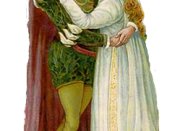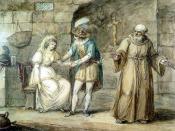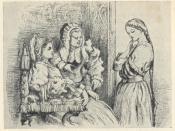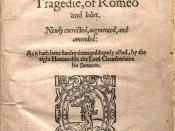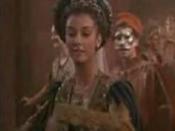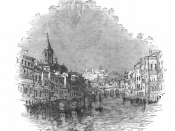Often a person criticizes something because he feels he can improve that which he is evaluating. This evaluation can be of anything from music to clothing to movies to people. One of the most prevalent forms of criticism is writing, as it is quite versatile in its ability to relate ideas. Victorian poet and critic Mathew Arnold said that literature is ?at bottom a criticism of life.? Well, this is an interesting thought. What this sentiment means is that if literature does nothing else, it remarks on everyday happenings in some way or another.
I personally agree with Arnold?s statement because much of literature is based on life, since authors often write about what they experience, and their opinions of life would naturally reflect in their work. Now, if this is true, it should be able to be applied to any piece of literature at all. For instance, in William Shakespeare?s tragedy Romeo and Juliet, there are many cases in this tragedy where Shakespeare criticizes aspects of teenage life.
Through much of this play, Shakespeare seems to present his characters as irrational and over dramatic. I think that feeling was intentional and key to the suspense in the story. In its own way, it sheds light on the urgency that encompasses the young lovers? minds and lets the reader understand their intense emotions. Shakespeare was most likely commenting on the fact that teenagers, on the whole, are very extreme in their emotions with no room for middle ground. For example, Romeo is a young man who could be best described as fickle. That is a common trait among adolescents ? they don?t know what they truly want. It?s the only constant attribute about him that carries through the entire play. One moment Romeo is in love with Rosaline, the next she?s a speck of dust to him as Romeo discovers Juliet. Another mannerism portrayed through this character is a teenager?s seeming inability to think ahead of his or her immediate actions. After Romeo meets Juliet, they hit it off right away and a few days later they are secretly wed. The problem with that, aside from the obvious, is that Juliet?s family and Romeo?s family are the two parties in a vehement feud that spans the ages. Again, another of life?s attributes slipping in: teenagers think they want what they cannot have. Romeo and Juliet?s love, being forbidden, made it all the more intense.
The other main character, Juliet, is also a written critique of life. Adding to Shakespeare?s thought that teenagers are capricious, shortsighted, and passionate, Juliet also portrays rebellion and deceit. Like most young people, Juliet deliberately disobeys her parents and does what she wants to. Juliet?s parents, Capulet and Lady Capulet, want her to marry Paris. However, Juliet has other plans, as she is already married to Romeo. To escape marrying two people, she feigns her own death so she can run away with Romeo. The latter part displays deceit towards her family and friends, but even though it was Juliet?s last lie, it certainly wasn?t her first. Throughout the entire drama, Juliet hides her marriage from her parents. Even though the opportunity to tell them had presented itself many times over, she never did. Through twists and turns of the plot, all the lies wind up getting both Romeo and Juliet killed.
The main characters aren?t the only ones written to represent aspects of life. The minor characters do as well. For instance, Benvolio is Romeo?s friend and somewhat like his advisor. Benvolio is always levelheaded, the calm amidst the storm. He seems to take Romeo?s father?s place in the story, as we don?t see much of Montague. With this character, Shakespeare might be saying that all teenagers aren?t bad ? some have their heads screwed on straight and can handle responsibility. Mercutio, on the other hand, is another one of Romeo?s friends and he is the exact opposite. Mercutio is always jovial and rowdy and somewhat careless of his actions, like a small child. I find this particularly interesting. It?s like Romeo?s two friends are ?the angel and the devil on his shoulders,? subtly telling him the right and the wrong things to do. Then there?s Tybalt, Juliet?s cousin. He?s ardent and fiery, the antagonist looking for a fight. He represents all the harsh emotions in life, but quite specifically hate.
Shakespeare personifies all the extreme emotions through one character or another in the play and heightens them to dramatize life. Using Romeo and Juliet, Shakespeare critiques the adolescents of his time. Generally speaking, he is saying they are full of the most intense feelings: uncertainty, responsibility, defiance, ardency, love, and hate. However, this criticism applies even today, as teenagers then and teenagers now are minutely different. This is because no matter what time period an adolescent is in, it is still the most confusing time of his life and he must sort through it all to find himself, what he stands for, and what he believes in.
